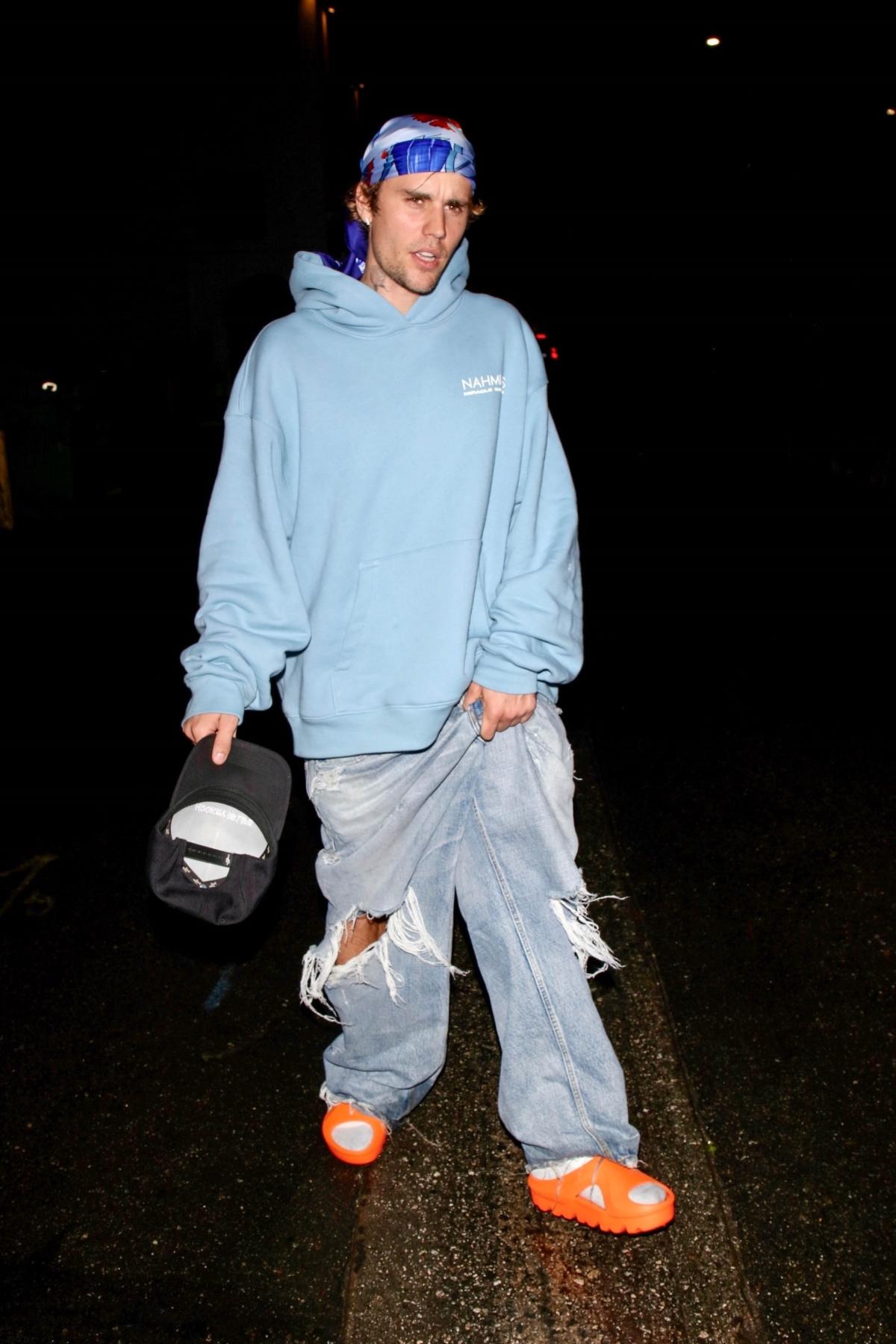Justin Bieber Death Rumors: What's True? Fact-Checking The Hoaxes
In an age saturated with digital information, have you ever questioned the veracity of a headline proclaiming the death of a beloved celebrity? The unsettling truth is that such rumors, often amplified by social media, are increasingly prevalent.
Understanding the rapid spread of such misinformation is critical, especially when considering figures like Justin Bieber, whose prominence in the music industry makes him a frequent target. This article seeks to dissect the origins of these rumors, the impact they have on fans, and the importance of discerning fact from fiction in the digital age.
This exploration will delve into the nature of celebrity death rumors, their psychological toll, and the methods to identify accurate information. Our goal is to equip readers with a comprehensive understanding of Justin Bieber's current status and the broader ramifications of celebrity culture in the digital landscape.
- Girthmaster Vs Miaz Fitness Gear Showdown Which Is Best
- Remote Control Raspberry Pi Your Ultimate Guide
- Biography of Justin Bieber
- The Origins of Justin Bieber Death Rumors
- Impact of Death Rumors on Fans
- Media Responsibility in Reporting Celebrity News
- The Importance of Fact-Checking
- Mental Health Considerations
- Celebrity Culture and Misinformation
- Conclusion and Call to Action
Justin Bieber, a name synonymous with pop music, emerged from Stratford, Ontario, Canada, a small town that would soon launch him onto the global stage. Born on March 1, 1994, in London, Ontario, Biebers journey to stardom began with self-taught musical skills and a relentless drive to share his talent. His early performances, documented on YouTube, caught the attention of talent manager Scooter Braun. This led to his signing with RBMG Records and a meteoric rise to fame.
Bieber's debut album, "My World 2.0," released in 2010, catapulted him into the public eye. The album featured the hit single "Baby," which quickly became a global sensation. Beyond the catchy tunes, Bieber's rise coincided with the burgeoning power of social media, which allowed him to connect directly with fans, fostering a dedicated and passionate fanbase that has followed him throughout his career.
| Personal Data | Information |
|---|---|
| Full Name | Justin Drew Bieber |
| Date of Birth | March 1, 1994 |
| Birthplace | London, Ontario, Canada |
| Music Genres | Pop, R&B, EDM |
| Record Labels | Def Jam, RBMG |
| Website | Official Website |
The genesis of rumors surrounding Justin Biebers alleged death can be traced to the vast and often unregulated landscape of social media. Platforms like Twitter, Facebook, and various online forums serve as breeding grounds for misinformation, where false reports can quickly gain traction and spread virally. These rumors are frequently born from a combination of factors, including deliberate hoaxes, unscrupulous celebrity gossip sites seeking clicks, and even malicious attempts to cause distress.
- Hdhub4u Today Your Guide To Streaming Movies Tv Shows
- Barron Trumps Singing Does He Have Musical Talent
One particularly notable incident occurred in 2013 when a fabricated news article circulated, falsely claiming that Bieber had died in a car accident. The speed with which this claim propagated across social media underscores the inherent vulnerability of the digital environment to such disinformation. The lack of stringent verification processes and the emotional nature of celebrity news often contribute to the rapid dissemination of unverified claims.
Understanding the Mechanism of Misinformation
Several elements contribute to the swift spread of false information regarding celebrity deaths:
- Social Media Influence: Social media platforms allow for instant sharing and amplification of unverified claims. The ease with which content can be shared means that inaccurate information can reach a vast audience in a matter of minutes.
- Emotional Responses: The emotional connection fans feel towards celebrities often leads to impulsive sharing of unverified news. Grief, shock, and concern can cloud judgment, causing fans to spread the news without fact-checking.
- Clickbait Titles: Sensational headlines designed to attract clicks increase the circulation of false information. These headlines exploit emotional triggers and curiosity to lure users, often leading them to unreliable sources.
The emotional toll of celebrity death rumors on fans can be significant. The parasocial relationships that fans develop with artists like Justin Bieber create a deep sense of connection, and false reports of death can trigger intense feelings of grief, anxiety, and disbelief. These emotional responses can be compounded by the pervasive nature of social media and the constant barrage of unverified information.
Psychological Effects
The potential emotional responses to celebrity death rumors include:
- Grief and Shock: Many fans experience profound grief or shock upon hearing the news, even when it is later proven false. The loss of a figure they admire and feel connected to can cause intense emotional distress.
- Distrust: Repeated exposure to false claims can lead to a general distrust of media sources and information. This erosion of trust can make it difficult for fans to discern credible information from misinformation.
- Social Media Fallout: Discussions and arguments on social media platforms can generate a toxic environment. Disagreements and the spread of further unverified claims can worsen the emotional impact on fans, creating a sense of isolation and anxiety.
The media's role in shaping public perception is paramount, particularly when dealing with sensitive topics such as celebrity deaths. Responsible reporting is essential to minimize the spread of misinformation and safeguard the emotional well-being of fans. The ethical standards of journalism necessitate a commitment to accuracy, fairness, and a clear understanding of the impact news has on audiences.
Best Practices for Media Outlets
To ensure accuracy, media outlets should adhere to the following practices:
- Verify Sources: Always confirm the authenticity of information before publishing. Cross-checking multiple sources and verifying the credibility of those sources is crucial.
- Avoid Sensationalism: Refrain from using clickbait headlines that mislead readers. Sensationalism often prioritizes shock value over accuracy, which can exacerbate the spread of misinformation.
- Provide Context: Offer context and background information to help readers understand the situation. This includes clarifying the source of information, the history of the rumors, and any official statements.
In an era where information is abundant, the practice of fact-checking has never been more vital. Consumers of news must be vigilant in verifying claims before sharing them. This vigilance is crucial to mitigating the spread of false information and preventing the emotional distress it can cause.
How to Fact-Check Effectively
Here are some effective steps to fact-check information:
- Cross-Reference Sources: Look for multiple credible sources reporting the same information. If only one source reports an event, its essential to be cautious. The more sources that corroborate the information, the more reliable it becomes.
- Check Dates: Ensure the news is current and not outdated. Old news can be easily re-circulated and mistaken for current events. Check the publication date to determine the relevance of the information.
- Consult Official Channels: Visit official social media pages or websites for updates from the celebrity or their representatives. Official channels are the most reliable sources of accurate information.
The spread of death rumors can have significant mental health implications for both fans and the celebrities involved. Justin Bieber has spoken openly about his struggles with mental health, highlighting the importance of addressing these issues. The constant bombardment of false information and the ensuing public scrutiny can be overwhelming for both the individual targeted and their fanbase.
Supporting Mental Health in the Celebrity Space
To foster a healthier environment, it is essential to prioritize mental health awareness:
- Encouraging Open Discussion: Create safe spaces for fans to express their feelings and concerns. Social media platforms and fan communities can provide opportunities for open, supportive dialogue.
- Promoting Resources: Share mental health resources for those affected by misinformation. This includes links to mental health organizations, crisis hotlines, and other support services.
- Advocating for Compassion: Encourage fans to approach news with empathy and understanding. It's important to consider the potential impact of rumors on both the celebrity and other fans.
Celebrity culture often blurs the line between reality and fiction. This culture can exacerbate the spread of misinformation, leading to harmful consequences. The constant scrutiny and the public's interest in celebrity lives create an environment ripe for the creation and spread of false information.
Addressing the Challenges of Celebrity Culture
To combat the negative aspects of celebrity culture, stakeholders must:
- Educate the Public: Raise awareness about the dangers of misinformation related to celebrities. This includes promoting media literacy and educating the public about the importance of fact-checking.
- Encourage Critical Thinking: Promote media literacy to help individuals discern fact from fiction. This includes teaching people how to evaluate sources, identify bias, and understand the difference between opinion and fact.
- Support Ethical Journalism: Advocate for responsible journalism practices that prioritize accuracy and truth. Holding media outlets accountable for spreading misinformation is crucial.
In essence, the rumors surrounding Justin Biebers death serve as a reminder of the critical importance of verifying information before sharing it. Misinformation can significantly impact both fans and celebrities, making it essential for individuals to embrace responsible sharing practices. We encourage readers to thoughtfully consider the information they consume and disseminate online.
Consider engaging with us by leaving comments below, sharing this article, or exploring more of our content. Your participation encourages accuracy and builds trust in the information age.



Detail Author:
- Name : Nicole Koelpin Sr.
- Username : gregoria.cronin
- Email : laura.padberg@yahoo.com
- Birthdate : 1974-10-31
- Address : 359 Lakin Plaza Suite 801 Kadeville, SD 00185
- Phone : (586) 857-4844
- Company : Padberg-Upton
- Job : Shear Machine Set-Up Operator
- Bio : Amet at sed animi possimus veritatis. Est nihil nihil consequatur qui nihil vitae adipisci. Fuga impedit est expedita autem. Quasi accusamus minus molestiae pariatur veritatis.
Socials
linkedin:
- url : https://linkedin.com/in/bryon_williamson
- username : bryon_williamson
- bio : Autem omnis reiciendis similique et rem vel.
- followers : 1500
- following : 547
twitter:
- url : https://twitter.com/bryon_real
- username : bryon_real
- bio : Est doloribus voluptas perspiciatis atque nobis. Nulla dolorem repudiandae quos. Vero impedit dolorem aperiam et.
- followers : 5001
- following : 338
facebook:
- url : https://facebook.com/bwilliamson
- username : bwilliamson
- bio : Est et enim aut omnis.
- followers : 2811
- following : 1128
instagram:
- url : https://instagram.com/bryon_williamson
- username : bryon_williamson
- bio : Inventore praesentium quibusdam qui nihil. Cum quo dolorem ratione.
- followers : 729
- following : 676
tiktok:
- url : https://tiktok.com/@bryon_williamson
- username : bryon_williamson
- bio : Corrupti in nostrum iusto quos sint.
- followers : 1619
- following : 2428